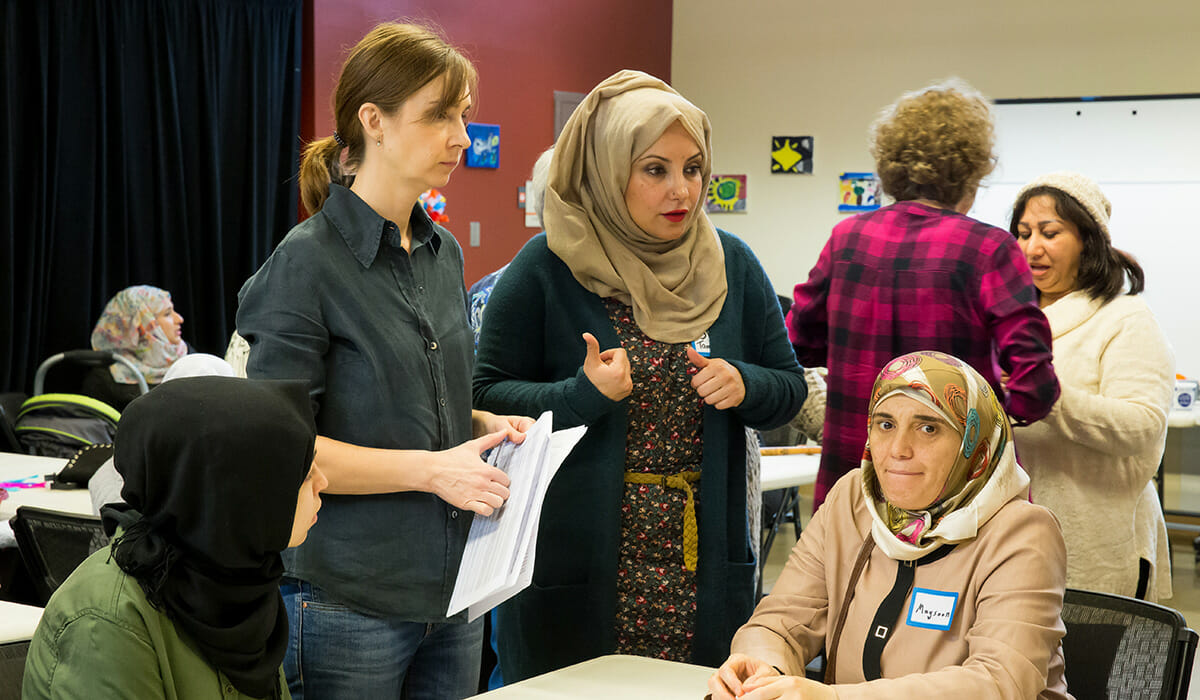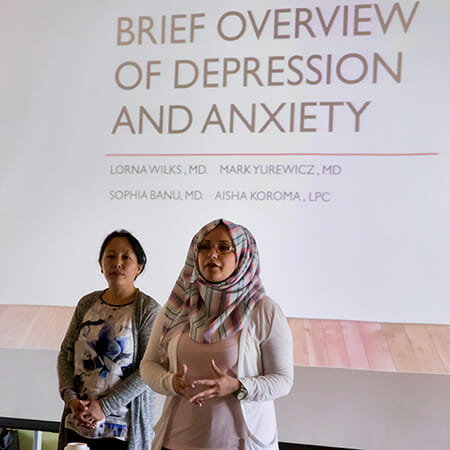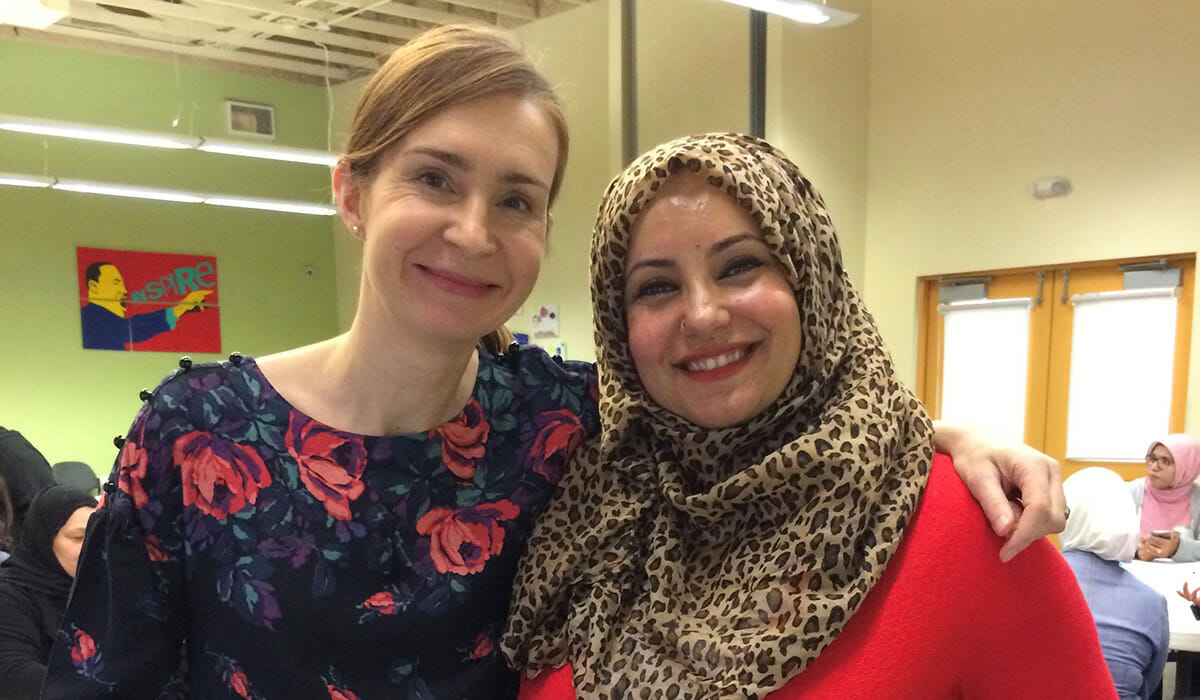Translator Helps Serve Houston’s Female Refugee Population with Women’s Empowerment Group

Meet Daily Point of Light Award honoree Tamara Al Rawwad. Read her story and nominate an outstanding volunteer or family as a Point of Light.
When Tamara Al Rawwad first came to the United States from Jordan in 2012, she received help from others to become acclimated to her new country. Now, she pays it forward to refugees newly arrived to the Houston, Texas area. Tamara, who is a nurse and also has a PhD in public health and social work, first worked as an admin for a Facebook page for people newly immigrated from the Middle East to find resources in Houston. When she heard Interfaith Ministries for Greater Houston, a diverse community organization, was searching for a translator, she thought the role would allow her to help even more.
Tamara serves as a translator for Interfaith Ministries’ Women’s Empowerment Group, which aims to bring together women who have recently immigrated to the United States and help them form a community as well as develop skills. The group frequently has guest speakers on informational topics ranging from U.S. law to financial literacy, and Tamara not only translates English for the women, but also helps add cultural relevance to the topics at hand.
Describe what Interfaith Ministries does.
Interfaith Ministries is a nonprofit organization that works with the State Department or works on different projects. One of them is Meals on Wheels and the other one is refugee services. Basically, they welcome the refugees and they work with them the first six months to settle them and provide information about the country and services. The specific initiative I was working with was the Women’s Empowerment Group. It started as a socialization group for these women who newly came to the country and didn’t know anyone there. They have escaped the horror of war in their country. It was an effort to educate them and it was also an opportunity for them to meet other refugees, and also other Americans, to keep the ties with their culture and also learn more about the new country.

What is your volunteer role?
The Women’s Empowerment Group started as socialization, but it had more activities in it. With the organizer, Chloe Krane, we did some interactive type of learning where we bring guest speakers who would talk about topics that would benefit these ladies — for example, the laws in the U.S., the medical problems or diseases, English classes, financial literacy. Because of my background, I’m a nurse and I also have a Master’s in public health and social work, I was able to interpret — not really literal interpretation, but summarizing what the speaker or the presenter would say and make it relatable to the women. They were coming from different cultures, and I’m aware of both the American and Middle Eastern culture. I would give examples they can relate to. It was a basically collaborative listening presentation between me and the presenter where I interpret but I also add the cultural relevance.
Why is it important for new arrivals to this country to have the type of resources Interfaith Ministries provides?
The newcomers, as anyone who goes to a new place, don’t have knowledge about the new country or city they’re moved in, plus there’s a language barrier. For someone who knows English, they can reach out to other people, ask questions, Google information they need. But for these new immigrants who are refugees, not all of them are educated, and they also have language proficiency issues. Interfaith was trying to pair some of these refugees families with volunteers, but the problem was not all of the volunteers know Arabic or the language, and the refugees don’t know English. So the idea of bringing in an interpreter who knows both languages was an initiative to overcome that. They also have interpreters for specific issues, like for case management. They’ve been working on so many levels, and that was one of the greatest initiatives they have, especially for women who stay at home. Most men, as soon as they come to the country, they are being hooked up with businesses where they can go out and work, but for these women, most of them stay at home. They needed something to not only connect them with the new host country, but also to encourage them and empower them, and let them try new things they wanted to try in their own countries but they were not really allowed.
What made you want to help the refugee community in the first place?
First of all, they’re coming from war-torn countries and they’ve been experiencing the horror of war, and they have a lot of trauma. With that, and with their kids and not being aware of the new laws and regulations, it’s a completely different culture. … The other thing is the mental health. In their countries, mental health is not a thing basically. If you have depression or anxiety, that’s because you’re weak and don’t know how to handle your issues. But here, they have the opportunity to access mental health services or to get help with their issues, especially them coming in with trauma and PTSD and all these issues. I felt they were not understood, also. I’ve heard a lot of comments about them like, ‘Why do they come here? Why don’t they stay in their countries? Why don’t they fight?’ All these comments coming from people who don’t know what a war means or what a civil war means, where you don’t know who’s with who.
The other thing is, some of these refugees come with degrees. They’re engineers and accountants and nurses and pharmacists, but when they come here, all their degrees mean nothing. They end up at home and it affects their self esteem, because they were something in their old countries, and when they came here, they had no value basically. Their value came from their work and their contribution to society and their homes. One of the things we try to do here is make them also active members of society here. We provide them with opportunities for volunteering. … I’m not coming from the same countries, but we’re from the same region, so I know what the people who are living in these countries learn. It was painful for me to see these countries break like that. The least I can do is help those coming into this country have a new start here.
What’s been the most rewarding part of your work?
Seeing peoples’ lives change. Just hearing, “Oh, thank you, you helped me with this” or “I didn’t know how to do this.” It’s the joy. The joy comes from seeing that whatever you did had a positive impact. Sometimes you don’t hear it right away or see it right away. It comes later. One example is one of the physicians who came here. She didn’t graduate from here so her degree was useless. I was encouraging her to do something else, like sonography or something, and she did. She was at home for two years and now she works. She’s happier and she’s active. She feels different and I was happy for her. There are many other examples. It’s just seeing what you do have a positive impact on other people’s lives.

Why do you think it’s important for others to give back?
I feel it’s like a pay it forward type of thing. I was helped during my stay in the U.S. by other people, so I feel I may not be able to give back to them, but I can help and give it to someone else. I experienced it first hand. Some people just don’t ask for help. We need to be proactive and look for these opportunities, and look for people who may silently suffer and may not know how to ask for help or their pride might stop them from doing that. The other thing is because it strengthens society and it’s what makes it a good place to live in. If all people do good things for each other, then that will erase the hatred and anger and misunderstandings.
What do you want people to learn from your story?
That being busy doesn’t really mean that you can’t volunteer. At that time, I was a doctorate student and I had two kids and I’m a single mom, but I found time to help other people. It really makes you feel good, because you might have a community who supports you, but some of these people don’t. It would be so great if you can help just one person who has no one to talk to or they can trust. If my work with this community or this group allows these women to open up and tell me things they wouldn’t tell anyone else, then that has also allowed me to help them. If I didn’t develop those trusting relationships with them, I wouldn’t have a chance to help them.
Do you want to make a difference in your community like Tamara? Find local volunteer opportunities.
